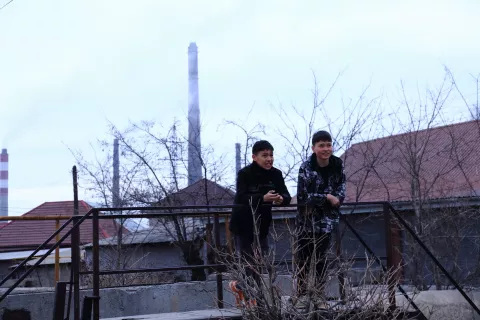In Kyrgyzstan, girls resist menstrual shame
In Kyrgyzstan, a team of teen girls are determined to lift the shroud of shame and despair on menstruation by raising awareness and supporting their peers

- Available in:
- English
- русский
In Kyrgyzstan, menstruation is rarely talked about. Girls enter puberty without understanding what is happening to their bodies, and suffer in shame and despair as a result. Many do not attend school during their periods, which affects their educational performance. Aigerim, a resourceful 17-year-old girl, is determined to ease the burden on her peers.
Recently, she and four other girls from the village of Vasilevka, in Kyrgyzstan’s northern Chui province, were among the teams trained to conduct peer-to-peer training on menstrual hygiene management.
I was very happy to participate in the training, What we learnt about women’s health will be useful for me, the girls in my village, and even all girls in Kyrgyzstan, for our entire lives.


Making schools girl-friendly
“When we returned to our village to give the training, it became clear to us that in most families, the mothers never talk with their daughters about menstruation. As a consequence, many problems appear,” Aigerim says.
Their observation is confirmed by UNICEF- commissioned research, conducted at six schools in two provinces. The 2015 study revealed that girls must often deal with menstruation on their own. Parents and teachers shy away from the topic, hoping that someone else will give the girls the knowledge they need.
Building on the research findings, UNICEF and Save the Children have recently conducted a training about menstruation to teachers. The aim: to make schools girl-friendly.
A total of 100 teachers from 100 schools participated in the training. Each was trained to further share their knowledge with colleagues and the girls they teach.
The research, advocacy and training are all part of the Wins4Girls project, funded by the Government of Canada. The project name is a refenrence to WASH – water, sanitation, and hygiene – and stands for WASH in Schools. Kyrgyzstan is one of 14 countries worldwide that are part of the Wins4Girls project.
Girls educate girls
Aigerim and other girls involved due to an idea by UNICEF WASH officer Esen Turusbekov: “When our Wins4Girls training for teachers was completed, I thought, why not to involve youth centres, too?”
To do this, UNICEF, Save the Children, and the NGO “Our Voice” were able to draw on municipality-run youth centres. Five teams of five girls were recruited from different centrees in the north of the country. They were all brought to Bishkek, where they learnt the essentials of menstrual hygiene management.
Shortly afterwards, the teams returned home, to conduct their own, peer-to-peer trainings. In all, 403 girls were trained by the five teams.
UNICEF peacebuilding officer Mariko Kato observed Aigerim and her teammates when they lectured to girls in their home village of Vasilevka: “I thought we might not have many girls attend in this particular village, which is quite conservative, with modest living conditions. But there were more than 30 participants, and I saw Aigerim doing really a good job,” Kato says.
“Aigerim told me that they had visited every family in the village, talked to the parents and convinced them to send their daughters to the training. That’s how committed they were.”
“I was very happy to participate in the training,” Aigerim says. “What we learnt about women’s health will be useful for me, the girls in my village, and even all girls in Kyrgyzstan, for our entire lives.”
“Nothing to be ashamed of”
The training also changed the way she thinks about menstruation: “Girls have learnt from childhood that talking about menstruation is inappropriate and shameful. But the training opened my eyes; I began to see that it is a natural biological process, and nothing to be ashamed of.”
From here onwards, the ambition of UNICEF is to secure funding to build awareness about menstrual hygiene across Kyrgyzstan – working both with teachers, and peer trainers such as Aigerim, to make every school girl-friendly.




